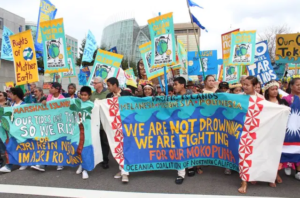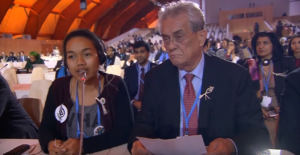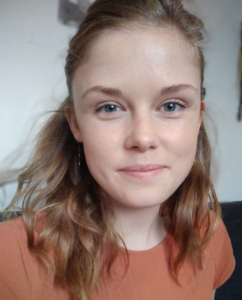Written by Miriam Ladstein, this post draws attention to the work and contributions of Pacific youth in local and global arenas where decisions concerning ocean and climate action are made.
![]()

Suva, Fiji January 2020. Photo: Miriam Ladstein
![]()
This January, I spent a few weeks with members of the OceanStates team in Fiji’s main capital, Suva. Suva is an eclectic city and a regional hub for economic, political, environmental and development activity in the Pacific. Within the city’s great blend of government officials, United Nations (UN) representatives, volunteers and employees of local and international non-governmental organizations, are a great variety of youth-led networks and organizations engaged in the empowerment youth in decision-making processes related to ocean, climate and social justice. While in Suva, I had the pleasure of meeting with representatives from a range of these networks, who shared some of their insights, experiences and perspectives on Pacific youth engagement in climate action. One of the OceanStates project’s main focus areas is how Pacific Islanders and their governments draw on the relationships between human lives and the ocean, and how they present and represent these relationships, their experiences and their cultural heritage on national and international levels in their work towards achieving lasting ocean and climate action. In this post, my focus is on the voices, expressions and roles of Pacific youth in these spaces.
![]()
The visibility of youth in ocean and climate action, advocacy and activism the world over has been growing tremendously over the past couple of years, and the engagement of Pacific youth is no exception. Pacific youth in Suva and across Oceania have been advocating for climate action and working to be heard by the international community for many years now. They have called international attention to ocean and climate issues through major anti fossil fuels campaigns, cultural empowerment campaigns, ambassadorship, poetry and performing arts.

Pacific Youth at the Climate Change March in Oakland, California on 7 Feb 2015. Photo: Dan Bacher.
In Suva, the volunteers, advocates, activists, warriors and artists of youth-led networks and organizations – who come from communities across Fiji and the Pacific region – work in creative, earnest and innovative ways throughout the year to empower their peers in decision-making processes. All the while negotiating traditional understandings of their societal roles, youth in Suva are tackling issues related to ocean, climate change, human rights and sustainable development, as well as a range of other related issues such as gender equality and LGBTQ rights. From the ground up, Pacific youth have contributed to shifting the international narrative and perception of their region’s response to climate change, from one of passive victimhood to one of strength and resilience, summed up in the emblematic words: “We are not drowning, we are fighting” *.
![]()

Selina Neirok Leem from Republic of the Marshall Islands (RMI) at the 2015 Paris Climate Conference (COP21), with former RMI foreign minister and climate ambassador Tony de Brum. Snapshot from video.
In recent years, youth from the Pacific have increasingly been invited to join their state leaders and representatives in global arenas such as the UN, to speak on the effects that climate and ocean change have not only on the economies and sovereignty of their nations, but also their human rights, their cultural heritage and identities. Contributing their voices, their stories, their opinions and their art, their presence at UN climate and ocean summits has helped to build and strengthen the narratives coming out of the Pacific region. By putting human – young human – faces to climate change, these youth remind the world that the right to speak on the consequences of ocean and climate change resides not only with those who have lived and learned and networked the longest. Turning this order on its head, the urgency of climate change has placed a great deal of moral authority with the youth, who have done the least to cause the challenges we face but have the most to lose. With the growing momentum of the global youth climate movement, world leaders now more than ever are called upon to recognize the voices, ideas, visions and worldviews of the youth, who will soon take over the reins and deal with these challenges in the years to come
![]()
At COP25* in Madrid, Fiji was one among ten nations to sign the Declaration on Children, Youth and Climate Action, uniting ‘around a strong commitment to accelerate inclusive, child and youth-friendly climate policies and action at national and global levels, including the need to enhance their participation in decision-making’*.
The declaration sends out a clear message that these nations intend to include youth in the decision-making processes leading up to global summits and policy events. At the same time, the road from declaration to implementation can be long. This is especially true when the road cannot help but intersect with long-standing social hierarchies that usually place the authority to lead, speak and make decisions for others with members of the older generations. With this in mind, one is compelled to ask – just how complicated is this intersection? And, how does it affect the efforts and opportunities of youth to meaningfully and effectively participate in decision-making processes on the ground? These are some of the questions that came up in conversations with youth advocates in Suva this January, as they shared their perspectives on how to balance respect for deep-rooted tradition with innovative ideas and visions for change in the future.
![]()
In Suva, where many of the important decision-making processes related to ocean and climate action in the Pacific take place, there is still some way to go in terms of including youth – as remains the case in many places around the world. However, what becomes clear to anyone moving attentively among youth and climate advocates in Suva, is that Pacific youth are continually and actively carving out spaces for themselves where their voices and perspectives can be heard. In a variety of arenas, Fijian and Pacific youth in Suva are contributing to the formation of new paths and patterns for participation, collaboration and decision-making, and in the process re-negotiating the roles they are expected to play in their communities, as well as in the collective fight against ocean and climate change.
I would like to sincerely thank every one who took the time to meet with me in Suva, for giving me insights into their work, experiences and views, and broadening my understanding of what climate activism means in Pacific contexts. I certainly heard you, and will continue to listen.

The Oceania Dance Theatre performing in ‘Moana Rua: the Rising of the Sea’* in Bergen, Norway 2015. Photo: Edvard Hviding
![]()
 Miriam Ladstein holds an MA in Social Anthropology from the University of Bergen. Her past research has focused on environmental perceptions and climate change among children and youth, with 7 months of fieldwork experience in Samoa and Fiji. She was research assistant and administrator on the OceanStates project from 2018-2020 and is currently coordinator for the Norway-Pacific Ocean-Climate Scholarship Programme (N-POC).
Miriam Ladstein holds an MA in Social Anthropology from the University of Bergen. Her past research has focused on environmental perceptions and climate change among children and youth, with 7 months of fieldwork experience in Samoa and Fiji. She was research assistant and administrator on the OceanStates project from 2018-2020 and is currently coordinator for the Norway-Pacific Ocean-Climate Scholarship Programme (N-POC).
Recommended literature on this topic: -Boege, V., Casimira, A., Ernst, M., Szesnat, F., 2013. Voices of the People. Perceptions and Preconditions for Democratic Develoment in Fiji. Institute for Research and Social Science of the Pacific Theological College -Borrevik, C., 2019. “We Started Climate Change”: A Multi-level Ethnography of Pacific Climate Leadership. Phd thesis. Department of Social anthropology, University of Bergen, Norway -Craney, A. 2019. Youth leadership in Fiji and Solomon Islands: Creating opportunities for civic engagement. In Pacific Youth: Local and Global Futures, ed. Helen Lee. ANU Press, Canberra, Australia -Fair, H., 2018. ‘Not Drowning but Fighting’: Faith, Activism, and Climate Change Narratives in the Pacific Islands. PhD thesis. Department of Geography. University College London, England -Lee, H. and A. Craney, 2019. Pacific youth, local and global. In Pacific Youth: Local and Global Futures, ed. Helen Lee. ANU Press. Canberra, Australia. -Vakaoti, Patrick 2014. Young people and democratic participation in Fiji. Suva, Fiji. Citizens’ Constitutional Forum.